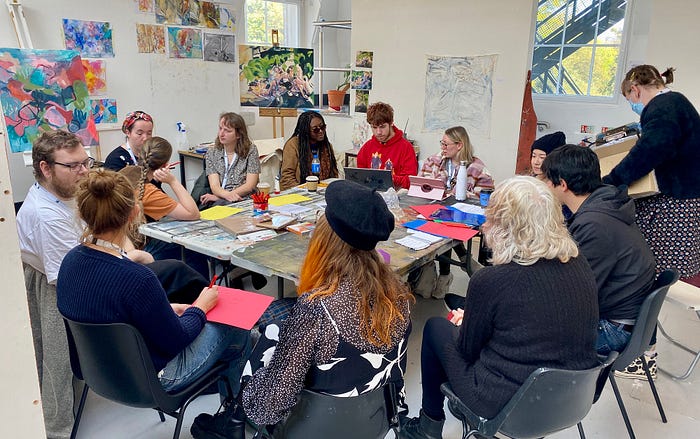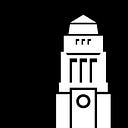We need to rethink assessment to make the arts more inclusive
The Irregular Art School is working with artists, arts professionals and carers to find ways that academic assessment can be more inclusive through collaboration.

We’re the Irregular Art Schools team, a group of artists and academics with and without learning disabilities working together to do research on inclusive artist development in Leeds.
The project came about by people discussing how being recognised as ‘professional’ artists can be hard for learning disabled creatives.
Often, it can be difficult for learning disabled artists to access traditional routes like higher education, engage in arts criticism through peer groups, or get involved with artist-led communities. Many face considerable barriers and inequalities and frequently rely on developing complex networks of support to pursue the arts.
With support from the Arts and Humanities Research Council, in February 2021, Irregular Art Schools was launched to explore these issues.
We want to learn how to best support learning disabled artists in Leeds, but to also ask bigger questions about inclusive learning and development in the arts too.
We’ve been experimenting with new artistic methods and partnerships, as well as working to bridge the gap across art and social care, in partnership with inclusive arts studio Pyramid, artist-led gallery and studios Assembly House and Leeds City Council’s adult social care team.
Why are we called Irregular Art Schools?
Great question! We were inspired by Professor Roger Slee’s book ‘The Irregular School’. He discusses how continuing to think in terms of the ‘regular’ school or the ‘special’ school obstructs progress towards inclusive education.
Rather than separating learning and development into ‘inclusive’ or ‘mainstream’, ‘regular’ or ‘special’, we instead want to experiment with making arts development opportunities ‘irregular’.
In our Irregular Art School, people with different life experiences, ways of knowing and ways of being, can progress and learn together side by side.
EXPLORERS at Tate Liverpool

On a chilly morning in November, we found ourselves on Liverpool’s Albert Dock. We had been invited by artists collective Project Art Works to facilitate a workshop at EXPLORERS run in partnership with Tate Liverpool.
EXPLORERS is a two-year national project running from 2021–2023 and aims to create equity for neurominorities (defined as people whose brains work in different ways to what is considered typical, for example, people with autism or dyslexia) and their carers in civic and cultural life. It aims to open routes into artistic practice for neurominorities, dismantling attitudinal and systemic barriers to representation and rights in art and society.
Martin Swan, Off-Site Programme Manager at Project Art Works describes how,
“Neurotypical thinking is so dominant in the arts and in culture generally, that there is very little research into neurodiverse approaches to supporting people to be who they are, and make art on their own terms.
This continues to marginalise neurodivergent artists, as (neurotypical) curators and gallerists are still wary this area of practice, seeing it as either therapeutic or labelling work as Outsider or Community Art; and ‘inclusive’ commissions are, too often, framed within neurotypical systems, leaving many artists still unable to respond and benefit.”
Our workshop called ‘Not Another Bloody Assessment!’ invited people to reflect on past experiences of being assessed. We then asked people to reimagine their ideal assessment approaches by creating mini protest signs.
We asked: What are all the ways you’ve been assessed in your life? How did it make you feel? How should you be assessed in the future? From this we hope to create an assessment manifesto for our Irregular Art School.

But, why focus on assessment?
Assessment has become a core question within our current research strand. Since October 2022, we have been collaborating with the School of Fine Art, History of Art and Cultural Studies at the University of Leeds. We have been exploring, alongside staff and students (Shanelle, Alison, Tianna, Nicole and Molly), what it means to develop as artists within an art school setting and we’ve been really interested in understanding their experiences of studying art at university.
Assessment has come up consistently as an area to explore: sometimes it can be extremely productive and rewarding and other times confusing or even harmful.
Prior to EXPLORERS, we ran this workshop with students and staff in the School of Fine Art, History of Art & Cultural Studies and found that people are assessed in many different ways in their lives and have many complex feelings about it.
What did we find out?
What was particularly interesting to see was the range of experiences people shared with us during the workshop: from care and health assessments, work interviews and appraisals to funding applications and peer review processes in the arts. People had many questions and feelings about these experiences, including:
“What are you assessing for?” There was a sense that many participants often felt unclear what was being assessed or how value or success was measured. Why do you need to know that? Where does this information go? “Feeling lack of control” and “exposed by questions.”
It was felt that assessment approaches were typically based on “deficit” not “potential.” However, attendees described that supportive processes helped build confidence, such as: “being asked how I want feedback” and “feedback considering my needs”
Who is doing the assessment can make a big difference; do they have “shared values” and/or “experiences” to those being assessed?
People then began to create their own mini protest signs that aimed to share what approaches to assessment should be like — how would assessment be if you wrote the rules? Here’s some things people said:
- “Can we just have a chat?”
- “Listen to us”
- “Assessments defined by me”
- “Please handle me gently, deliver me safely, open me carefully”
- “Can’t we make it visual?”
- “Supportive development, NOT judgement”
- “Make us feel supported.”
Recognising the emotional dimension to assessment
What we learnt from this event is that there is a strong emotional dimension to being assessed and there is often a desire for people to be more actively included in setting and shaping assessment criteria and approaches. People also questioned whether assessment was even necessary in some circumstances and whether we need to think more creatively about evaluation.
Becky Waite, Manager with Blue Room inclusive arts studio and attendee of our workshop says,
“‘Assessment’ can be an invisible process that is ‘done to’ a person rather than ‘with’. If artists are more involved in and aware of assessment processes, it allows us to work together to design more inclusive tools for decision making.”
We agree. We also think that by having artists involved in designing processes, they will get to have more of a say in how ideas of success are defined and captured in the first place.
This has prompted us to think about different assessment approaches in the arts — could some of the criteria for assessment be produced by the individual themselves — allowing them to define what matters to them and in what ways they wish to express themselves?
What’s next?
We are currently working on an exhibition with students that will open at the beginning of February 2023. Our exhibition will showcase our collaboration with School of Fine Art, History of Art and Cultural Studies at the University of Leeds.
We hope our work will start to spark new ideas about what inclusive assessment could look like.
Our exhibition The Irregular Art School opens February 3rd 2023 at the University of Leeds from 3pm in the Project Space at the School of Fine Art, History of Art and Cultural Studies, University of Leeds.
Talk to us about assessment or find out more about our events by contacting Dr Jade French on J.French2@leeds.ac.uk.
